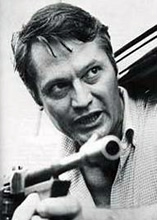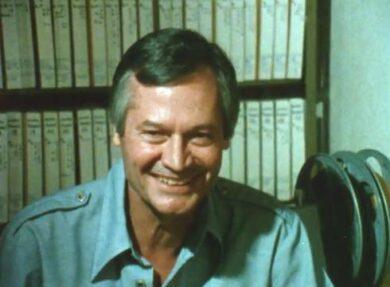What hasn’t been said about the recently deceased Roger Corman? Not a whole lot. Between the books devoted to the man—including Corman’s own HOW I MADE A HUNDRED MOVIES IN HOLLYWOOD AND NEVER LOST A DIME (1990), Ed Naha’s THE FILMS OF ROGER CORMAN: BRILLIANCE ON A BUDGET (1982), Beverly Gray’s ROGER CORMAN: BLOOD SUCKING VAMPIRES, FLESH-EATING COCKROACHES, AND DRILLER KILLERS (2012) and Chris Alexander’s CORMAN/POE (2023)—and the documentaries ROGER CORMAN: HOLLYWOOD’S WILD ANGEL (1978) and CORMAN’S WORLD: EXPLOITS OF A HOLLYWOOD REBEL (2011), his oeuvre has been pretty thoroughly covered. The man was even fictionalized in Tim Lucas’ THE MAN WITH KALEIDOSCOPE EYES (2022).
ROGER CORMAN: HOLLYWOOD’S WILD ANGEL (Documentary Trailer)
What I’ve learned is that Mr. Corman was a uniquely multifaceted individual. His directorial endeavors, spanning the years 1955-1971 (with 1990’s FRANKENSTEIN UNBOUND providing a late period outlier), were pretty homogenous in orientation (nearly all were exploitation quickies made for the drive-in market) but quite varied in theme and subject matter. Three distinct periods tend to be assigned to the Corman helmed movies, with the first dozen consisting of disposable trash fests like THE BEAST WITH A MILLION EYES (1955) and IT CONQUERED THE WORLD (1956), followed by a middle period of solidly made potboilers like ROCK ALL NIGHT (1957) and MACHINE-GUN KELLY (1958), and finally a succession of ambitious (by exploitation standards) projects like THE TRIP (1967) and BLOODY MAMA (1970) that layered social commentary into their narratives.
THE BEAST WITH A MILLION EYES (Trailer)
IT CONQUERED THE WORLD (Trailer)
THE TRIP (Trailer)
Prior to the ascendency of Ed Wood to the status of cult icon Corman was widely viewed as the epitome of schlock moviemaking. George Lucas actually used Corman as a synonym for down-and-dirty when, speaking about movie budgets, he stated that “anything under $20 million is pretty cheap. Anything under $10 million is almost impossible. And anything under $5 million is Roger Corman.” Of course, Corman attained mainstream recognition long before any of his exploitation movie peers, having been given a 1964 Museum of Modern Art retrospective and feted in the fall 1971 issue of FILM COMMENT (in which he was praised for “reflecting a sensibility painfully attuned to the undercurrents of violence gripping the country” and managing to “create a catharsis in the purest Aristotelian sense”).
Corman subsequently became a trash movie mogul in the mold of his former bosses James F. Nicholson and Samuel Z. Arkoff. As co-founder of New World Pictures, Corman demonstrated an uncanny ability to spot talent, with Jack Nicholson, Francis Ford Coppola, Peter Bogdonovich, Joe Dante, Paul Bartel, Manahem Golan, Jonathan Demme, Martin Scorsese, Ron Howard and James Cameron all getting their starts with Corman. New World, for the record, turned out a slew of interesting, if not always great, movies like BOXCAR BERTHA (1972), HOLLYWOOD BOULEVARD (1976), PIRANHA (1978) and ROCK ‘N’ ROLL HIGH SCHOOL (1979).
Corman’s inevitable defection from New World occurred in 1983. He subsequently founded Concorde-New Horizons and turned his attention to the straight-to-video market of the late eighties and nineties. Here, though, the Midas touch Corman had previously displayed appeared to have atrophied, as his early nineties attempt at a family friendly rebrand was a fail (as evidenced by 1994’s notorious FANTASTIC FOUR), and nor did too many future geniuses emerge from Corman’s post-1990 stable (with Kat Shea Rubin and Jennifer Love Hewitt being the biggest names). He also courted far more controversy in this period than he did previously, with a documentary, SOME NUDITY REQUIRED (1998), that directly called out the sexism of the erotic thrillers (such as 1991’s KILLER INSTINCT and 1994’s ANGEL OF DESTRUCTION) that were integral to Concorde’s output.
SOME NUDITY REQUIRED 1993 (Clip)
Things got even bleaker in Corman’s post -2000 period. The movies he made then were less impactful than his family films and erotic thrillers (anyone remember SLAUGHTER STUDIOS or DINOCROC?), and he missed out on employing at least one future talent: Eli Roth, who claims Corman approached him after the success of Roth’s debut feature CABIN FEVER (2002) and half-jokingly told him he “should have made it with me.” Roth replied that he’d tried to do just that, but couldn’t get his script past Corman’s gatekeepers.
SLAUGHTER STUDIOS (Trailer)
Granted, in light of Corman’s trailblazing early triumphs I don’t guess it really matters what happened in his latter years. I say his greatest late-period successes were his partnerships with Disney and Shout! Factory in 2005 and ‘10, respectively, to redistribute his back catalogue (which apparently led to Corman’s own children suing him and his wife to get access to that catalogue).
In his final years Corman took on the guise of a distinguished elder statesman. As such he was feted alongside Lauren Bacall at the Academy Awards Governors’ Ball and made countless media appearances in which he imparted Samuel Arkoff once stated, “Roger is Roger,” and I for one wouldn’t have wanted it any other way.
MACHINE GUN KELLY (Trailer)




